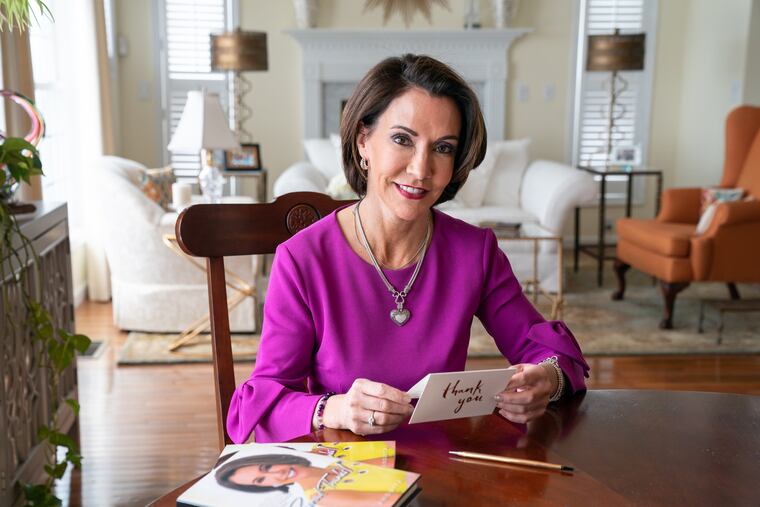Could writing a daily thank-you note transform your life?
Spread Thanks founder Elena Anguita is pushing the power of gratitude.

Over the past few years, Elena Anguita has written close to 2,000 thank-you notes. Her first one went to a friend who lent Anguita a hand with decorating her Scranton home. Anguita felt joy in the process, so the next day, she wrote another note, this time to a colleague assisting her at work. The day after, she hand-inked a note to a helpful grocery store clerk. And then to her sister, an airport security officer, the concierge at a Marriott hotel, her mom, and a list of many others who have played both large and small roles her in life.
The daily ritual, she says, is one that completely transformed her life.
“It’s such a simple practice, but I am now more at peace, less stressed, healthier, and just happier, every single day,” says Anguita, 55, who can count on two fingers the number of days she’s missed since starting her daily letter-writing practice four years ago. “I knew if this could do so much to impact me, it could help others."
In 2017, Anguita launched Spread Thanks, authoring a book under the same name, designed to encourage others to join in the gratitude. Through her book and in-person workshops (she presents often at Philly business and social clubs, most recently at the Pyramid and the Walnut), Anguita teaches a daily, three-step practice: write a thank-you note, pay attention to the positive happenings of each day, and journal about one happy moment from the last 24 hours.
“It forces you to become in tune with all of the gifts that you’re given, every single day, most of which we don’t recognize because we’re so busy,” says Andrea Wilczynski, a working mother of two from Yardley who adopted the Spread Thanks practice a year ago. “At the beginning, the response feels shocking — I have an entire box of thank-you notes for my thank-you notes, each of which make you realize how much you’re actually touching people. That uplifts your own mood, and it creates this cycle of positivity.”
A growing body of research confirms that expressing gratitude can boost both mental and physical health. Studies link gratefulness to improving everything from heart health and immune function to reducing symptoms of chronic pain and depression. Those who are grateful are shown to be generally happier and exhibit a greater sense of overall well-being, too.
“If you take a moment to become appreciative of the good, the frustrating parts of life lose their intensity,” explains Julie Mayer, a clinical psychologist and president of PSCP: The Psychology Network. “For people who’ve experienced trauma, it’s often very difficult to refocus from feeling like a victim. Gratitude helps shift your perspective so that you focus on the here and now rather than dwelling on the negative.”
For Anguita, moments of adversity now feel simply like life lessons that draw in new people to meet and create new opportunities to be thankful.
"There was one day when I was driving home from work, and these two-by-fours started flying out of the truck in front of me. Two of my tires immediately went flat,” Anguita recalls of one such situation. “Before, I would’ve gotten out of my car shaking and yelling a few ‘s-bombs’, but instead I felt calm, instantly grateful that the accident wasn’t worse.”
The night of the incident, Anguita wrote a thank-you note to the Walmart manager who had helped her quickly facilitate a tire change. Her daily journal entry focused on the joy she felt from all who contributed to getting her back on the road in time to make it to dinner at her sister’s house.
“There is always someone out there that’s deserving of a note,” says Anguita.
The letters have brought Anguita closer to all sorts of people in her life, particularly to her two sisters. When sibling quarrels unfold, she turns to the thank-you notes to help diffuse the conflict.
“Taking that step back to reflect forces you to stop and quiet your mind, and then you can start to hear the other side of the argument," says Anguita, who also spreads thanks at Edgenuity, an educational products company where she’s an account executive. “There are always two sides to an argument.”
Tom Cody, 48, a manager of infrastructure services at the University of Scranton, began the Spread Thanks practice last winter. He credits it with helping him find closure after the passing of his mother, to whom he wrote a posthumous letter of thanks for all that she had done for him.
"It allowed me to finish healing,” says Cody. “It was another chance to say things I wish I had expressed while she was here.”
Anguita notes that letters addressed to yourself aren’t off-limits, either. The important thing is to stick with the practice until it becomes habit.
“It’s just like exercise, where once you start to feel the benefits, you think, ‘Hey, I have to keep doing this all the time,’ ” she says. “It feels so good to make other people feel valued, and it also creates a feeling of connectedness. When we start to recognize that we’re all connected, anger and hostility decrease.”
Anguita sells Spread Thanks starter kits online, which include her book, a journal, and 30 thank-you notes and envelopes. Five percent of the proceeds are donated to 826 National, an organization dedicated to helping students improve their expository and creative writing skills.
As for the future, Anguita dreams of a day when the question, “Have you spread thanks today?” becomes as common as “Hey, how was your weekend?”